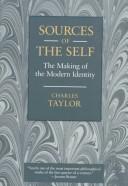| Listing 1 - 2 of 2 |
Sort by
|

ISBN: 0521383315 0521429498 0674824261 0674824253 9780521383318 9780674824263 9780674824256 Year: 1989 Publisher: Cambridge Cambridge University press
Abstract | Keywords | Export | Availability | Bookmark
 Loading...
Loading...Choose an application
- Reference Manager
- EndNote
- RefWorks (Direct export to RefWorks)
811 Filosofie --- Philosophical anthropology --- Philosophy and psychology of culture --- #GOSA:II.P.AU.3 --- Civilization, Modern --- Ethics --- Self (Philosophy) --- Anthropology, Philosophical --- Man (Philosophy) --- Civilization --- Life --- Ontology --- Humanism --- Persons --- Philosophy of mind --- Philosophy --- Deontology --- Ethics, Primitive --- Ethology --- Moral philosophy --- Morality --- Morals --- Philosophy, Moral --- Science, Moral --- Values --- Modern civilization --- Modernity --- Renaissance --- History --- Civilization, Modern. --- Ethics. --- Philosophical anthropology. --- Self (Philosophy). --- Philosophy, Modern --- Civilisation moderne et contemporaine --- Morale --- Philosophie moderne --- Moi (Philosophie) --- General ethics --- Moi (philosophie) --- Civilisation --- Philosophie --- Identité (philosophie) --- 20e siècle
Book
ISBN: 9780745641577 0745641571 074564158X 9780745641584 Year: 2013 Publisher: Cambridge : Polity,
Abstract | Keywords | Export | Availability | Bookmark
 Loading...
Loading...Choose an application
- Reference Manager
- EndNote
- RefWorks (Direct export to RefWorks)
The Posthuman offers both an introduction and major contribution to contemporary debates on the posthuman. Digital 'second life', genetically modified food, advanced prosthetics, robotics and reproductive technologies are familiar facets of our globally linked and technologically mediated societies. This has blurred the traditional distinction between the human and its others, exposing the non-naturalistic structure of the human. The Posthuman starts by exploring the extent to which a post-humanist move displaces the traditional humanistic unity of the subject. Rather than perceiving this situation as a loss of cognitive and moral self-mastery, Braidotti argues that the posthuman helps us make sense of our flexible and multiple identities. Braidotti then analyzes the escalating effects of post-anthropocentric thought, which encompass not only other species, but also the sustainability of our planet as a whole. Because contemporary market economies profit from the control and commodification of all that lives, they result in hybridization, erasing categorical distinctions between the human and other species, seeds, plants, animals and bacteria. These dislocations induced by globalized cultures and economies enable a critique of anthropocentrism, but how reliable are they as indicators of a sustainable future? The Posthuman concludes by considering the implications of these shifts for the institutional practice of the humanities. Braidotti outlines new forms of cosmopolitan neo-humanism that emerge from the spectrum of post-colonial and race studies, as well as gender analysis and environmentalism. The challenge of the posthuman condition consists in seizing the opportunities for new social bonding and community building, while pursuing sustainability and empowerment.
Persons. --- Philosophical anthropology. --- Biotechnology. --- Personnes --- posthumanisme --- Human beings --- Philosophical anthropology --- 130.2 --- antropologie --- cultuurfilosofie --- filosofie --- identiteit --- Anthropology, Philosophical --- Man (Philosophy) --- Civilization --- Life --- Ontology --- Humanism --- Persons --- Philosophy of mind --- Homo sapiens --- Human race --- Humanity (Human beings) --- Humankind --- Humans --- Man --- Mankind --- People --- Hominids --- Philosophy --- #SBIB:316.7C120 --- #SBIB:1H30 --- 316.323.9 --- 316.323.9 Postmoderne maatschappij. Sociologie van het postmodernisme --- Postmoderne maatschappij. Sociologie van het postmodernisme --- Cultuursociologie: algemene en theoretische werken --- Filosofie van de mens, wijsgerige antropologie --- Anthropologie philosophique --- Biotechnologie --- Human beings. --- Corps humain --- Philosophie de l'homme --- Technologie --- Homme --- Philosophie. --- Aspect social --- Effets des innovations --- Innovations --- Rosa Braidotti --- Rosi Braidotti --- #SBIB:39A3 --- Antropologie: geschiedenis, theorie, wetenschap (incl. grondleggers van de antropologie als wetenschap) --- Corps humain - Philosophie. --- Technologie - Aspect social --- Homme - Effets des innovations --- Corps humain - Innovations --- Feminism --- Gender --- Climate --- Technology --- Science --- Book
| Listing 1 - 2 of 2 |
Sort by
|

 Search
Search Feedback
Feedback About
About Help
Help News
News